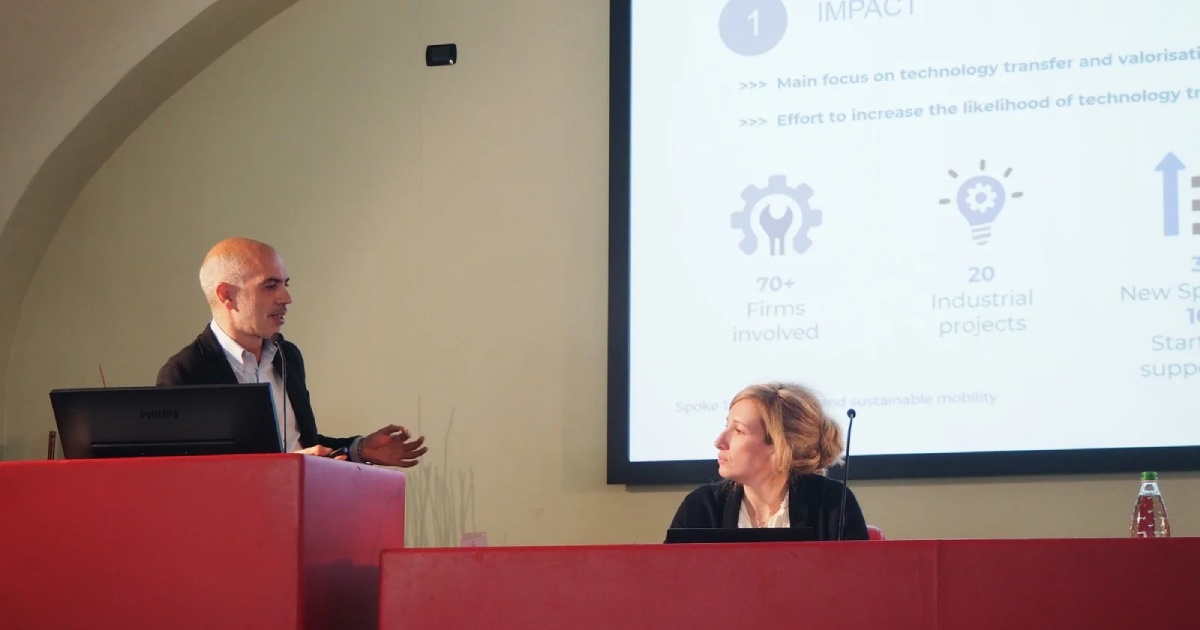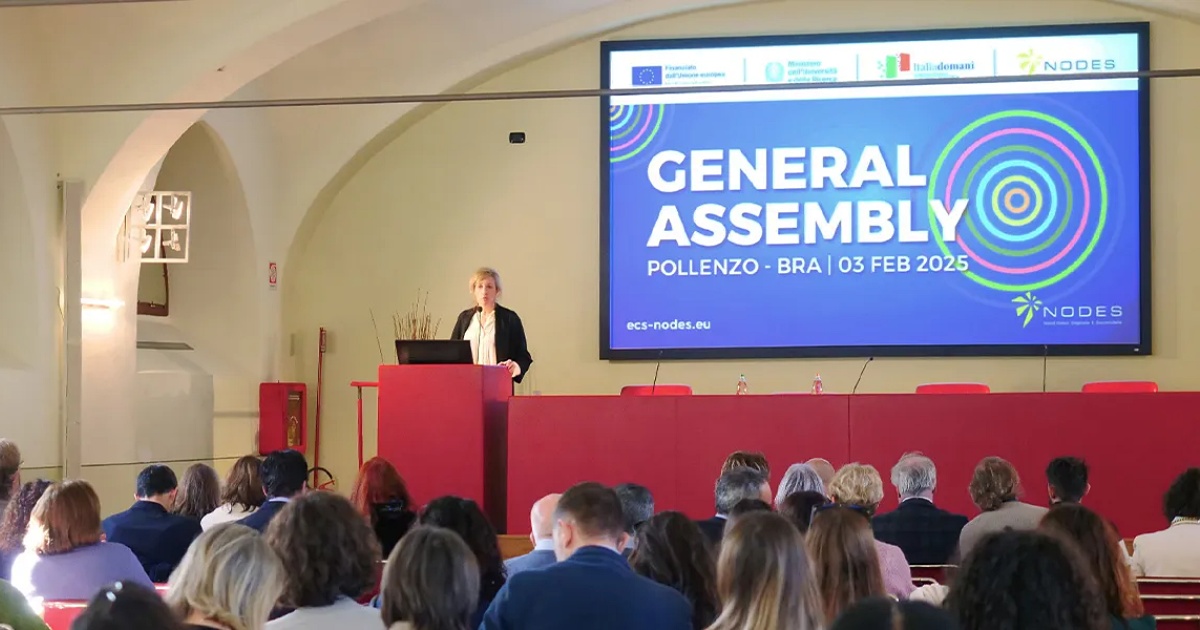On Monday, February 3, 2025, the fifth General Assembly of the NODES Ecosystem was held at the Red Hall of the prestigious University of Gastronomic Sciences in Pollenzo, located in the province of Cuneo in Piedmont, Italy.
The event demonstrated the large response of the NODES community to the invitation, with a large and heartfelt participation. More than a hundred people attended, including representatives from Universities, Innovation Poles, Research Centers, Incubators - including I3P, among the main partners of NODES' Spoke 1 - and Competence Centers, who discussed an increasingly crucial topic: the obtained results and their impact on the future.
The project, initially scheduled to end in September 2025, is now in its 27th month of activity and has received an extension from the Italian Ministry of University and Research until December 31, 2025. So what will be the expectations for the final year of operation and what is the vision for the future, even beyond the end of the current year?
The Rector of the University of Gastronomic Sciences, Nicola Perullo, welcomed the Assembly, recalling how NODES - Northwest Digital And Sustainable - represents a project of great significance for the University, “a long journey that will hopefully bear fruit beyond the National Recovery and Resilience Plan (PNRR), paving the way for new and exciting collaborations.”
The numbers of the project
The data with which 2024, the second year of operation, closed confirm again a positive trend. In particular, 56% of the funds committed by NODES partners have already been spent, amounting to €41 million out of the planned 73.7; the mentioned results included the 15 flagship projects and more than 141 years-per-person already deployed. Scientific achievements are also prominent, as evidenced by publications, patents and collaborations with companies.
However, aspects for improvement and small deficits were not overlooked, especially with regard to partners in the South of Italy and the call by all for productive cooperation in order to make the National Ecosystem, from North to South, as efficient as possible.
Finally, the offer of pathways in the Competence field for the territory was emphasized, which makes a peculiar and recognizable Ecosystem “that works”, emphasized NODES General Director Chiara Ferroni, who expressed particular gratitude to all the people who consistently support and are committed to the success of the activities, with special thanks to the administrative departments involved in extremely intense work.
The seven Spokes of NODES
The work then continued through the speeches of the 7 Spokes who initiated a collective discussion to deepen the results obtained and reflect on the concrete impact that the NODES Ecosystem is generating in the different areas.
The speakers were, in order: Giuseppe Scellato (PoliTo / I3P), Cristina Prandi (UniTo), Barbara Pozzo (Uninsubria), Marco Alderighi (UniVdA), Anna Osello (PoliTo), Stefano Tedeschi (UniVdA), Roberto Bosio (PoliTo), Marco Invernizzi (UPO), Hermes Giberti (UniPv), Dario Vallauri (Miac - Polo Agrifood).
Each, for their respective Spoke, shared success stories between flagship projects and applied research, recounted courses launched under the Competence Booster, immersive labs, and activities that stimulated growth. Together they also illustrated the challenges in fostering dialogue between universities and companies and the outreach initiatives aimed at both the local area and citizens on NODES issues. Each talk concluded with a reflection on next steps and a vision of the future in relation to their area of expertise.

Thus began a shared journey between the Hub and each SPOKE, aimed at reflecting on the actual impact and outlining future prospects, shining a strong focus for 2025 on how the changes generated by the project will be measured and disseminated: an essential aspect for the long-term visibility and sustainability of the initiative.
Measuring the practical impact
The microphone was then passed to Elisa Copertino, the Hub's contact person for monitoring indicators and measuring impact of the NODES Program, who announced the creation of a task force precisely on the topic of “Impact”. A working group that will involve key figures from the Spokes, the Hub and that will deal with the “changes” produced by the NODES Project: impact both transversal for the benefit of the whole Ecosystem, its networks and partners, and sectoral, assessing technological innovation, scientific and market development for each Spoke's area of reference.
Everything will then have to be properly communicated, as mentioned by Luca Agostino, Communication & Dissemination Manager for Hub NODES, who pointed out the good numbers produced by NODES channels and the rich calendar of initiatives planned in 2025: the events, publications, and campaigns that will allow people to perceive what the Ecosystem has achieved.
After a lunch break at the University's Academic Tables, the Spoke went on in the afternoon to present the results obtained in more detail in the various Work Packages (WPs):
- Giuseppe Scellato (PoliTo / I3P), for Aerospace and Sustainable Mobility, emphasized the interaction with businesses through roadshows, the creation of innovative start-ups and the fruitful collaboration with UniTO for “Students' challenges.”
- Edoardo Braccio (UniTo), for Green Technologies and Sustainable Industries, focused on Roundgrip, internationalization and competence activities that have a good impact on the local area.
- Barbara Pozzo (Uninsubria), for Culture and Tourism Industry, continues on the theme of internationalization with a project aimed at networking between UNESCO Cities, Silk and Textile Museums and the University.
- Marco Alderighi (UniVda), for Digital Innovation toward Sustainable Mountain, highlighted the successes of some projects, and growth on the Competence Booster as well.
- Marco Invernizzi (UPO), for Industry for Health and Silver Economy, paused to assess the successes achieved, despite slowdowns due to the indispensable phases of experimentation.
- Hermes Giberti (UniPv), for Primary Agroindustry, e Luisa Torri (UniSG), Secondary Agroindustry, reported in a SWOT key the weaknesses and criticalities affecting the NODES project, stressing how it is essential today to find an effective business model for the project to live and walk on its own legs in the future, also reflecting on internationalization issues.

